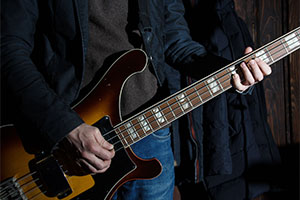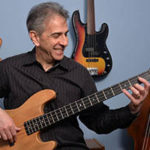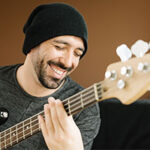There’s not a kid in the world who’s got what you’ve got
By Jon Liebman
August 5, 2022
What’s the difference between a 10-year-old kid taking piano lessons and a 60-year-old adult learning bass?
Well, plenty.
For us older folks, there are overall differences in the way we approach any task. Also, with age, there are typically differences in levels of discipline, maturity, diligence in our practicing, and so on, not to mention what our bodies can (and can’t) handle.
Embrace the differences
I had a great conversation recently with Baba Elefante for this week’s FBPO interview. As a bass player, Baba has done a ton of stuff over the years, including TV, movies, records, and solo gigs. I asked Baba how he approaches teaching bass to older students compared to younger ones.
“I really do try,” Baba says, “if I get a younger student, to show them proper technique – not bending their wrists, relaxing, trying to get into almost a meditative mode.
As Baba gets a fair number of adult students too, people who want to learn bass and play the kinds of music they loved so much when they were younger, he handles them a bit differently.
“When I get older students,” he says, “it’s usually people who want to try something new or they’re actually playing out, but never learned, they just emulated. For those kinds of players I start with the basics of chord tones and show them what they’re already doing,” explaining the relationships between scales and chords, for example.
Here’s what you need to do
At the end of the day, we all need to learn the same stuff, regardless of how old we are. Anyone learning bass needs to be able to lock in with the drummer, set the foundation for the band, and make the music feel good.
“Basics are so important,” Baba concurs. “I’m a firm believer that, no matter what level (you’re at), if you go from the ground up and are shown basics, it gives you something to build off of (no matter your age).”
Here’s what you don’t need to do
Another important point is the common misconception that as we get older, we can’t play bass because of the amount of wear and tear it puts on our bodies.
But that’s not necessarily true, says Baba. There are so many incredible players on YouTube who are fun to watch. But don’t think that being a good bass player means showing off incredible feats of dazzling, chops-infused solos. While impressive, it really has nothing to do with the true role of a bass player. “With the era of YouTube,” Baba says, “we think everyone has to do calisthenics. You won’t work if you do that all the time.”
You don’t have to be Mr. Universe
How much physical exertion do you think you need to put forth in order to play a good, solid, feel-good bass line? How many 16th notes do you think you have to be able to play in a minute in order to have fun and give the music what it needs?
“With older students,” Baba says, “you can show them more comfortable ways to play and reinforce the fact that you don’t have to have Victor Wooten chops. You can play songs and enjoy music playing some simple things, and that’s really what it’s all about. Simple is actually one of the best things on bass.”
Chances are you already have all the chops you need
I’m not saying playing bass is easy. It takes time, study, focus, practice. Those things may not come easy to a 10-year-old, but they’re not beyond what you’re capable of doing. And when it comes to the physical aspects of playing bass, keep Baba’s comment in mind when he says, “You don’t need to have Victor Wooten chops.”
Sometimes all you need to play are a couple of notes per measure to get the job done. Start easy, do what you can. If it’s too much, back off a little then try again.
Always keep this in mind
Most importantly, think of the big picture. It’s about the music. Learn the basics, learn your bass technique, but remember why you’re doing it, especially when things get tough.
You’ve listened to a lot of great music in your life and you know what you love and what you don’t. There’s not a 10-year-old in the world who’s got what you’ve got, so double down on those qualities and see what you can do. You’ll be amazed at how wonderfully different you are.
Your turn: How is concept this resonating with you? Leave a comment below and let me know your thoughts on how you’re dealing with learning bass as a grownup. Then check out my interview with Baba here.





I am 60 and don’t have enough time to practice like I should. What I’ve done is try to focus on learning chord tones, triads and arpeggios, including inversions. It’s amazing how much that which is not extremely complicated can contribute to fretboard knowledge, musical knowledge etc. When focusing on those tones, you technically can’t play a wrong note.
Something else worth pointing out to the older crowd. I have arthritis in my left hand, primarily the small finger which hurt. At first, I thought I shouldn’t use it for bass anymore but my finger hurts more when not using it. Practicing and using it like any other finger actually helps with the pain management. It also caused me to look at alternative fingerings including the 4th finger and using open strings. Working on one right now where I switch between 2nd finger, 4th finger & open string on a simple chord progression that focuses on two chords, A6 & Bm7th. I work a lot still but find the music fun and a great distraction from running my own business.
Thanks so much, Perry. A lot of my students are dealing with the same types of things (arthritis, etc.). I’m glad you found workaround that gets the job done. I’m really happy you shared this!